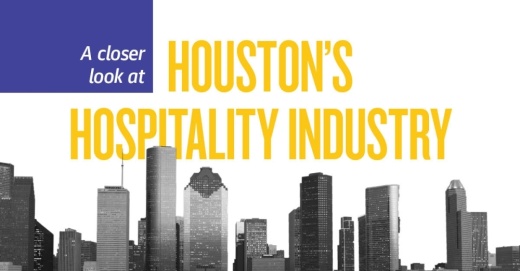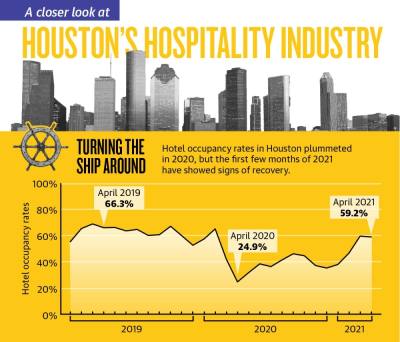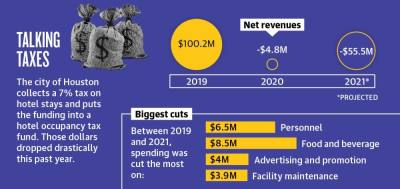Although early projections from hospitality forecasters suggested the industry would not recover until 2024, consulting firms like Price Waterhouse Cooper have since been revising projections to show occupancy and room rates may bounce back to 2019 levels as soon as 2023.
As a result, hotel owners and officials who promote travel to the city of Houston have expressed optimism about the future.
“What you are seeing is a quicker recovery than most people anticipated,” said Michael Heckman, the CEO of Houston First Corp., which collects hotel taxes and promotes tourism on behalf of the city. “This summer is going to be very busy from a leisure/traveler perspective.”
Heckman said the key to the recovery of the hospitality industry lies in building confidence in people that it is safe to travel again. The efficacy of the coronavirus vaccine and the updated guidance from the U.S. Centers for Disease Control and Prevention both played a role in improving that outlook, he said.
Houston hosted 12 citywide conventions between July and December of 2019, Heckman said, a record at the time. In 2021, 14 such conventions have been booked to take place over that same time, he said.
“That’s going to be a really significant driver for not just our hotels, but our hospitality industry in general, whether they be Ubers or taxis or restaurants or suppliers for events like this,” he said.
The pent-up demand for travel is undeniable, Heckman said. Concerts that normally take weeks to sell out are instead selling out within an hour, he said. Astroworld, a concert by Houston-born rapper Travis Scott in November, sold 100,000 tickets within 72 minutes, he said.
Over Memorial Day weekend, hotel occupancy was about 80% marketwide, ahead of where it was in 2019, Heckman said.
Talking business
Although leisure travel is on the rise, the most crucial part of the recovery for hospitality—business travel—has not yet bounced back at the same level, said Nick Massad, vice president of development with the Houston-based American Liberty Hospitality, which operates several hotels in the Houston area, including a Holiday Inn Express/Staybridge Suites near the Galleria.
“If you look at the weekly calendar, you have Sunday through Thursday where everyone is working, and that’s the best time [for hotels] in Houston,” Massad said. “But then on Friday and Saturday when ... you want to spend two to three days on a trip, you usually don’t pick Houston. We have experienced this forever in Houston. We’re a business town.”
Heckman said he expects corporate business travel to pick back up post-Labor Day as more children go back to school and companies go back to working from offices.
“The good news for Houston is that oil is at $70 per barrel,” he said. “That bodes well for business travel.”
Massad said they are working to get to the point where they are breaking even. However, he said the location in the fast-growing Galleria area and dual brand give a reason for optimism. With American Liberty being local to the area, Massad said he hopes guests will notice the effort to invest in and create a quality experience as well.
"We are the ones choosing that better product; we're the ones choosing to pay our people more," Massad said. "I'm not just here to invest in a hotel and then flip it."
For the InterContinental Houston hotel in the Texas Medical Center, the pains of the pandemic were still felt, but not as harsh as other parts of the city, Director of Sales and Marketing Doug Kelly said. His team also leveraged the hotel’s restaurant Safina and its proximity to museums and the Houston Zoo to draw residents from nearby communities, he said. The hotel also partnered with smaller businesses in Rice Village on promotions to help each other get through the pandemic.
“The component that is still missing is international travel,” he said. “Once those restrictions are lifted, there should be even more of an uptick.”
The hotel, which stayed open throughout the pandemic with precautions in place, has seen occupancy steadily increasing since the end of 2020 with even more notable upticks since around April. Jorge Landa, the hotel's general manager, said they have also seen a large increase in repeat business.
"Group business is still in its initial stages," he said. "Business will probably be at a more or less normal stage at this beginning of next year."
Broader consequences
A lagging hospitality industry has consequences that go beyond hotels, Heckman said. When people pay to stay at a hotel within the city of Houston, they are charged a 17% tax. The city collects 7%, while the remaining 10% is split between the state, Harris County and the Harris County Houston Sports Authority. Those funds can be used for everything from marketing the city to maintaining sports venues to providing grants to local art organizations.
Houston First, which raised about $87.5 million in hotel occupancy tax revenue in 2019, now projects to raise $56.8 million in its fiscal year 2021-22 budget, which was adopted in December. A $55 million operating deficit means Houston First will likely have to dip into cash reserves or resort to other credit facilities to balance the budget, Heckman said.
In addition to providing funds for arts organizations, hotel tax revenue benefits Houston First partner organizations such as Discovery Green.
“We have to spend money on the arts because frankly they can’t support themselves with nice facilities,” Massad said. “The faster that we can get those travelers back to the city, the faster those revenues come back and everybody’s budgets are full.”
Investments made by Houston First this year are intended to help restart the city, a prospect that Heckman said he is more optimistic about every day.
“It was a difficult year to budget for, but things do look a lot better as we go through this year, and they will look significantly better as we get into 2022,” he said.







